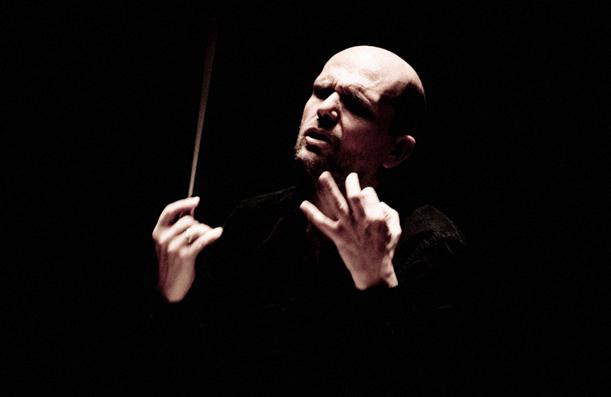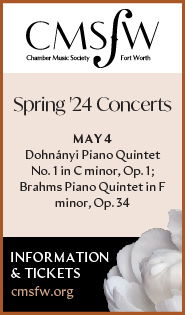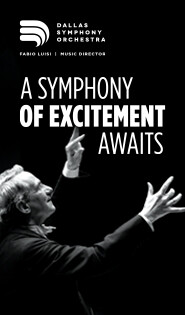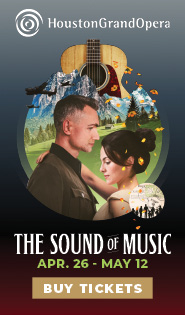Van Zweden bids farewell to DSO with a concerto premiere and a momentous Beethoven Ninth

Jaap van Zweden conducted works of Leshnoff and Beethoven Thursday night in his final program as Dallas Symphony Orchestra music director.
Thursday night at Meyerson Symphony Center, Jaap van Zweden opened his final weekend as music director of the Dallas Symphony Orchestra with a concert that made history on several levels.
First and most obviously, this weekend’s three performances mark the end of a decade-long tenure during which the orchestra reached a high point in its history. In spite of the changes roiling the international musical community, the Dallas Symphony clearly reached a new level of excellence under van Zweden. Although one could quibble over the details week to week or fine points of the orchestra’s general direction, van Zweden is leaving an orchestra in fine condition to move forward and to enhance its position in the local community and in the larger world of music. The Dallas Symphony continues to function as an essential and, indeed, central element of cultural life in Dallas and the surrounding region.
For his part, van Zweden, a podium leader more dour than charismatic, has emerged during his decade here as a key player on the international scene; largely unknown to the broad base of the classical music audience when he arrived in Dallas, he will, as music director of the New York Philharmonic, move into one of the most visible positions in the music world, with all the opportunities and pitfalls that position implies. He will step onto a podium once occupied by Bernstein, Boulez and Mahler, and into scrutiny far more intense than any he experienced in Dallas.
Less momentously, this weekend’s concerts also present the debut of a new violin concerto by Jonathan Leshnoff. The Dallas Symphony under van Zweden has not been a friendly zone for new music: indeed, entire seasons have passed without a single work by a living composer. The premiere of the Leshnoff work, which grew out of friendly professional interaction between the composer and concertmaster Alexander Kerr (who appeared as soloist for the performance), represents in many ways a process that will hopefully become more frequent for the Dallas Symphony as it moves forward under an as-yet-unnamed new music director.
The work in question, Leshnoff’s Violin Concerto No. 2, presented a number of characteristics that lead one to believe it may have a place in the repertoire. Four succinct movements balance lyrical, listener-friendly material within something very close to standard concerto structure; and, although the general atmosphere of the work is modern, with an aura of the fast-paced energy of our time, elements of the past abound.
The opening of the first movement evokes Sibelius’ Violin Concerto, as the soloist emerges, quasi-recitative style, against a murmuring accompaniment; the movement then unfolds in a classical sonata-like structure, with an upward-striving, romantic second theme, but one drawing on the energy of Glass-like repetition.
The first, third, and fourth movements of the concerto are straightforwardly titled “Fast,” “Scherzo,” and “Fast.” The second, however, appears under the more mysterious heading of “Yud: Chochma—Slow,” implying, with evocation of Jewish mysticism, origins and expansion. While the rest of the concerto is scored for a full orchestra with winds and percussion, the violin soloist is here joined by strings only, with a very brief appearance of the harp. A quality of desolate lyricism pervades here in a movement reminiscent in mood of the slow movement of Bruch’s G Minor Violin Concerto.
Unfailing jauntiness characterizes the ensuing Scherzo, with energetic themes tossed from one instrument to another; the quick finale follows the venerable tradition of closing a violin concerto with a relentless but cheerful perpetuum mobile, compete with Paganini-like figurations for the soloist and a neatly surprising ending.
At twenty minutes, Leshnoff’s Violin Concerto No. 2 is a nearly perfect marriage of form and content, with an unfailingly palatable harmonic and melodic language. The one major flaw in the work is the tendency of relatively dense orchestral scoring to interfere with the ability of the soloist to shine; while the balance was perfect in the slow movement with strings only, Kerr all too often disappeared into the orchestral texture in much of the rest of the work. The soloist handled the wide-ranging moods as well the intricate passage-work of this part neatly, though there were moments when his presence could have been more aggressively asserted in terms of volume and balance with the orchestra.
After intermission, Beethoven’s Ninth Symphony provided a momentous farewell showcase for a music director departing on friendly terms. Van Zweden offered the opening phrase with almost fragile reticence, before blasting into that initial fortissimo and setting the tone for a stormy, high-contrast reading of this monument of the symphonic repertoire. The recapitulation of the first movement became, in van Zweden’s reading, apocalyptic in tone.
The acoustic and visual design of the Meyerson Symphony Center provides a wonderful setting for mammoth works of this sort: significantly, van Zweden placed the timpani squarely at the center of the orchestra and directly beneath the chorus, and unabashedly turned the second movement, with its prominent tympani role, into a noisy tympani concerto. Although the central section of the movement had a thrilling rush in the middle section, the noise level of the tympani in the outer sections was inappropriately ear-splitting and distracting. The third movement continued van Zweden’s strategy of extreme contrasts, with a generally delicate atmosphere interrupted by an overstated trumpet fanfare.
In another departure from tradition, van Zweden placed the vocal soloists in the middle of the second violin section; baritone Matthias Goerne (recovered, seemingly from last week) and tenor Stuart Skelton both have the sort of gigantic, resonant voices Beethoven demands in these brief but excruciatingly difficult roles. Soprano Ellie Dehn stepped in effectively as a last-minute substitute for the ailing Lise Lindstrom, shining through in that one pivotal (and also technically difficult) rising phrase, with mezzo-soprano Michelle DeYoung likewise contributing her rich quality to the ensemble. With van Zweden, this quartet of soloists found a high degree of subtlety and suspense in a role that can, if not carefully handled, degenerate into a shouting match.
The Dallas Symphony Chorus, trained by Joshua Habermann, provided the tidal wave of sound required here; a single row of sopranos and altos placed one level up in a second balcony above the choral terrace provided a spine-tingling ribbon of sound at key moments, demonstrating that this is, after all, possibly the finest room in America for large-scale choral-orchestral works. The well-trained chorus likewise provided chillingly explosive accents on those wonderful German consonants, and a well-controlled but obvious crescendo on the word “Millionen” communicated that concept with powerful effectiveness.
In spite of a tendency to overplay the loud moments, van Zweden produced a thrilling finale; the innovative form and concept that grabbed audiences in the early nineteenth century and throughout the romantic era may no longer surprise, but continues to intrigue. Combined with Beethoven’s masterful musical concept, Schiller’s text, preaching a rational Deism with a dash of neo-paganism and a heavy dose of brotherhood-of-man, continues to comfort and inspire in the troubled twenty-first century world.
The program will be repeated 7:30 p.m. Friday and Saturday at Meyerson Symphony Center. 214-692-0203; mydso.com



Posted May 26, 2018 at 5:12 am by Sho-mei Pelletier
As a member of the DSO Violin Section for Maestro van Zweden’s
tenure of 10 years, it has been a THRILL and an HONOR working
with him! A spectacular Era for the DSO, indeed!